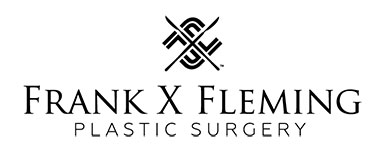Do men ever have cosmetic surgery?
More and more men are choosing to improve their appearance through cosmetic surgery. These procedures commonly include facial cosmetic surgery, liposuction, and male breast reduction.
What are the most popular procedures for men?
Common procedures performed on men include liposuction, male breast reduction, and blepharoplasty.
Is there anything to do to minimize swelling or bruising after surgery?
Depending on the procedure, certain resting positions and ice may help with post-op swelling. Also avoiding medications that thin the blood for two weeks prior to surgery is important.
How soon can I return to work?
The length of time it takes to recover after plastic surgery varies depending on the procedure performed and the type of work that you do. This information will be discussed during your consultation.
Does Dr. Fleming see many patients from out of town?
Yes, most of Dr. Fleming’s referrals come from happy and satisfied patients. Frequently, friends and family of Dr. Fleming’s patients travel to the Tri-Cities to have him perform their procedures.
How do I find a qualified Cosmetic Surgeon?
You can start by verifying the physician’s credentials. Your surgeon should be board certified, which signifies that they have the knowledge, skill and experience required to provide quality patient care in a given specialty.
- You can verify your surgeon’s credentials at Certificationmatters.org or abms.org. You can look up Dr. Fleming’s credentials here by typing in his full name: Dr. Francis X. Fleming.
- Ensure that the facility where the procedure takes place is fully accredited. Many cosmetic surgery procedures are done on an outpatient basis. It is important to verify that the facility meets the proper accreditation criteria to ensure your safety.
- Ask the physician for photographs of their work.
- Consider the surgeon’s experience.
How long have they been performing this procedure?
How many of these procedures have they performed? - Make sure that all of your questions are answered. Have you been fully informed about all possible risks?
How can I be sure that my surgeon has the proper training to perform my procedure?
The most IMPORTANT decision someone can make before undergoing cosmetic surgery is choosing a qualified plastic surgeon. Be very careful, verify credentials, and investigate.
- The best way to determine this is to find out if the surgeon is certified by the American Board of Plastic Surgery, which is a member board of the American Board of Medical Specialties. This certification is what hospitals use to determine if a surgeon is properly trained in a specific specialty, and can admit patients to the hospital and perform these types of surgeries.
- You can verify your surgeon’s credentials at Certificationmatters.org or the American Board of Plastic Surgery.
- If your doctor does not have admitting privileges at your local hospital for your procedure, it may be an indication that they do not have the proper training and certification.
What is the difference between cosmetic and reconstructive surgery?
- Cosmetic surgery is performed to reshape normal structures of the body in order to improve appearance and self-esteem. Cosmetic surgery is not covered by health insurance because it is not medically necessary.
- Reconstructive surgery is performed on abnormal structures of the body caused by congenital defects, developmental abnormalities, trauma, infection, tumors or disease. In general, reconstructive surgery is performed to improve function, but may also be completed to approximate a normal appearance. Reconstructive surgery is typically covered by most health insurance policies.
Does Dr. Fleming see many patients who have had surgery performed by unqualified providers?
Unfortunately, yes. Most state medical boards do not regulate procedures that are done in a doctor’s office. Therefore, it is not uncommon for inadequately trained providers to dabble in cosmetic surgical procedures. Unfortunately, if a surgical procedure is not performed correctly, it is typically extremely difficult to restore a patient to a normal contour or appearance. Additionally, to try and save money, some patients go out of the country to have cosmetic surgery procedures done in Mexico or South America. Many times it is difficult to assess whether these surgeons or doctors have the proper training, and they are not available to help if there is a problem when these patients return home. Dr. Fleming has seen many patients over the years who have been injured by having procedures performed by unqualified providers.
Where will my procedure be performed?
- Dr. Fleming performs his surgeries at Kadlec Regional Medical Center. Most elective surgeries are performed on an outpatient basis, and patients typically go home about an hour or two after the procedure is completed.
- If you are contemplating having surgery it is important to determine whether the facility where your procedure will be performed is certified as safe by one of the credentialing entities such as the Joint Commission on Accreditation in Healthcare Organizations (JCAHO), American Association for Accreditation of Ambulatory Surgery Facilities or the Accreditation Association for Ambulatory Health Care.
What are some common questions that I should ask my surgeon during the consultation?
What is the best procedure for me?
Where will you perform the procedure?
How long have you been doing this procedure?
How many of these procedures have you performed?
What are the risks involved? How long will recovery take?
Do you have hospital privileges and at which hospital? Are you board certified in plastic surgery?
How much will the procedure cost? Are there financing options available?
How are complications handled?
What can I expect if I schedule a consultation?
- One of the best ways you can decide if cosmetic surgery is right for you is by meeting with our Plastic Surgeon, Dr. Fleming, for a consultation. During your initial consultation, you and Dr. Fleming will discuss your goals and expectations. Dr. Fleming will also:
- Review your complete medical history, including reviewing past and current medications
- Evaluate the part of your body that you want treated
- Give recommendations
- Answer any questions you may have
- You should leave your visit with a clear idea of the surgical options available to you as well as the risks involved. If you and Dr. Fleming decide upon a procedure, our appointment staff will work with you to schedule your surgery. You will be given complete information regarding where and when to arrive, any eating/drinking restrictions prior to your surgery, what to bring with you and the length of your hospital stay. If any testing is required, you will be scheduled for an appointment prior to your surgery.
What should I know about the safety of outpatient surgery?
- It is important to learn about the safety of a plastic surgery procedure, as well as the expected outcome. Although thousands of people have plastic surgery every year without complications, no surgical procedure is risk-free.
- To maximize your safety, you should verify the following:
- That your surgeon is certified by the American Board of Plastic Surgery (ABPS)
- That your physician has hospital privileges at a reputable hospital. Most cosmetic surgery procedures are performed on an out-patient basis, and can safely be performed at an outpatient surgery center. However, no surgery is risk free, and if there is a life threatening complication during your surgery, it is important that your surgeon had admitting privileges at a nearby hospital.
- The surgical facility conforms to strict safety standards and is accredited by the Joint Commission on Accreditation in Healthcare Organizations (JCAHO), American Association for Accreditation of Ambulatory Surgery Facilities or theAccreditation Association for Ambulatory Health Care.
- The surgical facility uses the appropriately licensed personnel to administer your anesthesia and monitor your recovery immediately following the procedure.
Is surgery performed under general or local anesthesia?
Depending upon what is required for your particular procedure, Dr. Fleming will decide what type of anesthesia is appropriate. He will answer any questions that you may have.
What are the most common procedures performed by Dr. Fleming?
- Breast: augmentation, lifts, reduction and reconstruction
- Abdominoplasty
- Liposuction
- Facial cosmetic surgery: face-lifts, eye-lifts and otoplasty
- Mommy makeovers
At what hospitals does Dr. Fleming have surgery privileges?
Kadlec Regional Medical Center.
How does a plastic surgeon gain hospital privileges?
To gain hospital privileges, a plastic surgeon will be evaluated by a committee of other doctors and surgeons on the hospital staff. The committee will do extensive background checks and review a doctors training. They will verify that they have the correct training and experience through the American Board of Plastic Surgery (ABPS), they will look at malpractice history, make sure the surgeon is free of criminal convictions and make sure the surgeon has no restrictions on their medical license.
Why is it important for my surgeon to have hospital privileges?
Before hospitals allow surgeons on staff, they do back ground checks. If a surgeon is unable to gain privileges at a local hospital this may be a red flag. If a doctor is doing an in office procedure on a patient and a complication arises it is important that the doctor have privileges to admit their patient to a local hospital.
My breasts are flat and saggy after pregnancy and nursing. What are my options?
This is a very common complaint. There are two ways to alter the breast shape to look more youthful. One way is to remove the excess skin from around the breast tissue through a procedure called a breast lift or mastopexy. Another method, called breast augmentation, involves the placement of breast implants to increase the size of the breast, which fills out the loose skin and improves the shape.
The muscles of my stomach separated when I was pregnant. Will a tummy tuck correct this?
Yes. During a tummy tuck, weakened or separated abdominal muscles are tightened, and excess fat and skin are removed.
What can I do about the sagging skin in the upper eyelids and "bags" in my lower eyelids that always make me look tired?
Unfortunately, this is a part of the aging process that can make someone appear sleep deprived, even though they are not. The solution is a surgical procedure called a blepharoplasty, or eyelift. With this procedure, the loose and sagging skin, as well as the excess fat around the eyelids, are removed. The incisions heal so well that they are practically invisible. Blepharoplasty is the second most common cosmetic surgery performed in the U.S.
I have spots of darker skin all over my face. What can be done about this?
Pigmentation spots commonly have two main causes. One type, called a solar lentigo, is caused by sun exposure and a genetic predisposition. The other common type is called melasma, often referred to as the pregnancy mask. These pigmentation spots can also be caused by hormone replacement therapy and contraceptive use. These can be treated by medical grade skin care products that have been proven to fade these pigmentations. Sometimes a peeling agent may be required to fully eradicate these blemishes.
I have deep wrinkles around my mouth and on my cheeks. Can these be removed?
Facial rejuvenation involves several modalities. First and foremost you must stop sun-tanning and use sunscreen. Next, begin a program of daily skin care with products that use alpha hydroxyl acids or retinoids. For moderate to deep wrinkles of the facial skin the treatment of choice would be a skin resurfacing procedure using a chemical peeling agent. These procedures can be done in the office. Generally, the recovery time for these procedures is 5 to 7 days.

